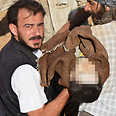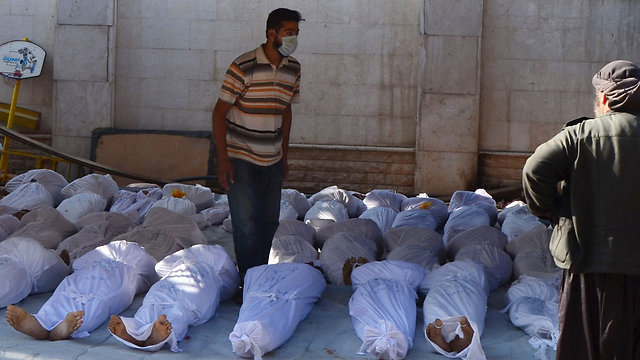
Experts: Syria symptoms consistent with nerve gas
Chemical, defense experts say convulsions, pinpoint pupils, labored breathing seen in victims of alleged chemical attack in Syria could be symptoms of sairn nerve gas. Meanwhile, UN chief requests Syria allow experts to cunduct investigation, sends envoy. US: 'At this time we are unable to conclusively determine' chems used
Meanwhile, the United Nations formally asked the Syrian government Thursday to authorize UN experts to investigate a reported chemical attack with mass casualties near Damascus. A US State Department spokesperson said that "at this time we are unable to conclusively determine" chemical weapons were used in the attack.
Related stories:
- Syrians retrieve 'sleeping' dead after alleged chem attack
- Russia, China prevent official UN probe of Syria
- Syrian opposition: Over 100 killed in chemical attack
Syria's main opposition group says more than 1,300 people were killed Wednesday in a government attack on rebel areas near Damascus – a charge the government vehemently denies. Footage distributed by activists showed people foaming at the mouth and doctors apparently giving people oxygen to help them breathe and trying to resuscitate unconscious children.
However, Jen Psaki, a spokesperson for the US State Department said in a press conference Thursday that at the time the US is "unable to conclusively determine" chemical weapons were used in the attack, but nonetheless noted that if the attacks are true "it would be an outrageous and flagrant escalation.
Chemical and defense experts said the symptoms appeared consistent with exposure to a nerve agent like sarin or VX.
"A large number of symptoms definitely point in that direction," said chemical weapons expert Jean Pascal Zanders, although he said much more information was needed for a definitive conclusion.
"Yesterday... I was skeptical about the claims of nerve agent neurotoxicants, I have revised my position on that a bit on the basis of footage I have seen later in the day where a number of symptoms consistent with organophosphorus poisoning" were apparent.
Organophosphorus is a chemical compound used in nerve agents like sarin – an odourless, paralysing gas developed by Nazi scientists and used by Iraqi dictator Saddam Hussein's regime to kill thousands of Kurds in 1988. It kills by asphyxiation.
However, experts said only tests on the alleged victims would provide definitive proof.
"A strong inference is being made that chemical weapons were used, but we need scientific proof like the presence of metabolites (what remains after a drug has been broken down by the body) of sarin in the blood or urine" of victims, Olivier Lepick, a chemical weapons researcher with France's Foundation for Strategic Research, told AFP.
Zanders said there was "widespread acceptance that sarin is part of Syria's military arsenal together with mustard agent and VX." It also had the capacity to deliver such agents, said Lepick, with rockets, aerial bombs, artillery shells and Scud missiles.
The first footage released showed victims with classic asphyxiation symptoms like a pinkish-blue face coloring, a black line around the mouth and coughing, said Zanders. Later images also revealed evidence of miosis – a dilution of the pupils, and convulsions that are typical of nerve agent poisoning.
"It is not only the symptoms but the whole context," said Ralf Trapp, a chemist and disarmament expert, who agreed the evidence of nerve agent use was "pretty strong". "We have a large number of people, which is what you would expect" with a nerve gas attack. "We have children, women and men."
According to Trapp, traces of nerve agent poisoning would remain in the urine of victims for several days and in the blood for weeks.
"It is absolutely not too late!" he said as Western governments demanded access to the sites of the alleged attacks for a team of UN weapons inspectors that arrived in Syria on Sunday.
'Not too late'
The comments came amid a formal request by the United Nations to the Syrian government Thursday to authorize UN experts to investigate a reported chemical attack with mass casualties near Damascus, a spokesperson said.
UN Secretary General Ban Ki-moon also has decided to send Angela Kane, the UN High Representative for Disarmament Affairs to Damascus, UN spokesperson Eduardo del Buey said.
Damascus had agreed at the end of July, following an earlier visit by Kane, to allow UN experts to investigate three other sites where chemical weapons attacks were alleged to have taken place.
"The secretary-general believes that the incidents reported yesterday need to be investigated without delay," del Buey said in a statement. "The secretary-general now calls for the mission, presently in Damascus, to be granted permission and access to swiftly investigate the incident which occurred on the morning of 21 August 2013.
"A formal request is being sent by the United Nations to the government of Syria in this regard. He expects to receive a positive response without delay," del Buey said. The UN chief also called for a cessation of hostilities so humanitarian aid could reach the victims of the fighting.
The UN spokesperson gave no details on when Kane would travel.
UN officials said the head of the UN experts team in Damascus, Ake Sellstrom of Sweden, has already begun negotiations with the Syrian authorities.
Reuters contributed to this report
- Receive Ynetnews updates directly to your desktop














